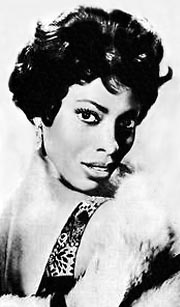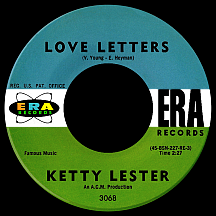KETTY LESTER
Love Letters
While studying to be a nurse at City College in San Francisco during the mid-1950s, Revoyda Frierson joined the school's choral group. Any thoughts of permanent employment in the medical field went by the wayside; the singing voice she was born with couldn't be denied. Soon she was involved with a theatrical group at the University of California, Berkeley. Later in the decade she was hired as a singer at the trendy Purple Onion nightclub in San Francisco's North Beach neighborhood and performed there regularly for over a year using the stage name Ketty Lester. In the early '60s she joined Cab Calloway for an extensive tour of South America. One unexpected turn of events followed another for this deeply moving singer from Hope, Arkansas. Oddly, her time in the music business was relatively brief. Who could have guessed that she would have a much longer career as an actress?
After her tour with Calloway, Ketty worked as a demo singer and made some recordings for the Everest record label. Ed Cobb (of The Four Preps) and Lincoln Mayorga (a pianist and arranger at Capitol Records) had recorded together as The Piltdown Men (making noise in the summer of 1960 with "Brontosaurus Stomp") and as The Link-Eddy Combo (known for the 1961 instrumental "Big Mr. C"). Lester auditioned for them and they were immediately struck by her emotional delivery of almost any type of song. They succeeded in getting her a five year contract with Los Angeles-based Era Records. In late 1961, the label released her first single, "I'm a Fool to Want You," but radio programmers preferred the flip side, "Love Letters."

Written by Victor Young and Edward Heyman, the title tune from the 1945 film Love Letters starring Jennifer Jones and Joseph Cotten received an Oscar nomination for Best Song, though the film version was strictly instrumental (Young picked up an additional nomination for the motion picture score). Crooner Dick Haymes had a minor hit with the song in the fall of that year. The song was ripe for a remake in the '60s and Lester's version fit the bill; the session was held at Armin Steiner's infamous bedroom-turned-studio above the garage at his parents' house in L.A. The setup was so cramped there was barely room for the drums, bass, organ and piano (beautifully played by Mayorga in an understated jazz-styled arrangement), while Ketty performed the vocal in Armin's bathroom! Her delivery of the lyrics pierce the heart with warmth and passion; the finished take should be required listening for anyone with plans to forge a career singing romantic ballads.
Stations in Southern California were first to play the song; it hit number one in Los Angeles in early March, then entered the top ten of the national pop and R&B charts at the end of the month. Everest Records made an attempt to capitalize on Ketty's newfound success with a single release in June of "Queen For a Day," one of the recordings she'd made for the label the previous year, but nothing came of it. Era followed the hit with George and Ira Gershwin's "But Not For Me," originally performed by Ginger Rogers in the 1930 Broadway musical Girl Crazy and by Judy Garland in the 1943 film of the same title. The song's arrangement was identical to "Love Letters," a risky move, but it had a respectable run, peaking just shy of the top 40.
Next came the midtempo "You Can't Lie to a Liar," a folkish lament from the pen of Paul Hampton. It made a brief appearance on the charts in October '62. Several weeks later, Era released her recording of Woody Guthrie's "This Land is Your Land," which charted the same week as the better-known version by The New Christy Minstrels. In 1963 she appeared in the British film Just For Fun singing "A Warm Summer Day," a song that appears to have been released only in the U.K. At about the time the film was in theaters, she found her name on the short list of nominees for a Grammy Award in the category Best Solo Vocal Performance, Female (she lost to Grammy fave Ella Fitzgerald).
In December 1963, Era Records president Herb Newman threw in the towel and sold Lester's contract to RCA Victor. During the next two years with the major label she had limited single and album releases; one song, "Some Things Are Better Left Unsaid," showed up on national singles charts in the spring of '64. She put the theatrical preparation of her college days to use in the Off-Broadway revival of Cabin in the Sky and received a 1964 Theatre World Award (given for outstanding debut performances on the New York stage). Ketty kept plugging away at her music career with releases on Tower and the oddly-named "Records by Pete" label. In 1966, Elvis Presley revived "Love Letters" using a near-identical arrangement; it reached the top 20, but Lester's version still stands as the most popular and best-selling recording of the song.
With her singing career at an impasse by 1968, Ketty focused her efforts on acting, starting with Jules Dassin's feature film Uptight. There were small parts in a vast array of television series, including The F.B.I., Green Acres, That Girl and a semi-regular stint on the 1969 NBC series Julia with Diahann Carroll. More TV roles followed: The Bill Cosby Show, Here Come the Brides, Room 222 and others. An appearance in the 1972 horror film Blacula gave her a footnote in the history of 1970s "blaxploitation" cult cinema. From 1975 to 1977 she was a regular on the daytime soap Days of Our Lives, followed by her long-running role as Hester-Sue Terhune on Michael Landon's beloved NBC series Little House on the Prairie. Literally dozens of films and television appearances followed her five-year run on the show from 1978 to '83, but for many she will always be Hester-Sue; some, it seems, don't even realize she was the same person who sang that fabulous 1962 hit "Love Letters." Ketty Lester enjoyed a steady presence in show business for four decades and can boast no less than two accomplishments for which she'll forever be fondly remembered.


